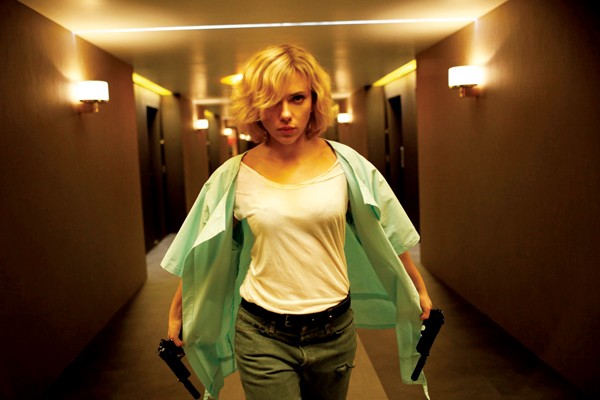I don’t tend to pay attention to script footnotes, but writer-director Luc Besson’s pre-production “Nota” about his new movie Lucy more or less says it all: “This film is extremely visual … the beginning is Leon the Professional; the middle is Inception; the end is 2001: A Space Odyssey … Don’t interpret this as pretension on my part, merely a visual, emotional, and philosophical point of reference.”
Lucy is many things — self-aware Asian gangster flick, crackpot neuroscience TED talk, half-cocked female empowerment fantasy, pants-optional F/X bacchanal, pop art companion piece to Theodore Sturgeon’s 1953 SF novel More Than Human — but it is not pretentious. It’s too self-aware and self-deprecating to take itself completely seriously. As a result, it’s really fun to watch, most of the time.

Scarlett Johansson stars in the fun and visually stunning film Lucy.
Like Taken, which Besson co-wrote and co-produced, Lucy begins as a paranoid thriller about an American abroad who gets mixed up with the wrong kind of person. Our titular hero is a bleach-blonde bimbo (Scarlett Johansson) forced by a sleazy dude in a cowboy hat to deliver a mysterious briefcase to an office building in Taiwan, where a high-level hoodlum (Min-sik Choi) spends his days in a giant suite, soaking his hands in the blood of those who’ve crossed him.
After a scary-funny reveal of the briefcase’s contents, Lucy is knocked out, operated on and impressed into service as a drug mule. However, when the fluorescent blue contents of the package surgically implanted in her belly start to leak, Lucy discovers that she can access up to 100 percent of her brain. Pretty soon she’s mowing down low-level thugs, contacting Professor Noman (Morgan Freeman) for advice about her altered state, changing her hair color at will, ignoring gravity’s pull, and bending the laws of space and time.

This is an excellent B-picture set-up. And like many excellent B-picture set-ups, it only really works if it’s accompanied by a manic, unflagging sense of style. That’s tough for anyone — even someone with Besson’s pedigree and flair for showmanship — to maintain. (Maybe it’s a two-person job: What would Neveldine/Taylor or Lord/Miller have done with this?) Once Besson depicts all the mobile-phone signals in Paris as a forest of multicolored data strands, what can he show us next? After he stages an exciting kung fu battle where nobody lands a punch, what can he trot out to top it? Luckily, Besson’s playful, smash-cut storytelling earns so much good will that when it all breaks down, it’s no big deal. The movie doesn’t make too much sense as it goes on, but that’s not a problem.
Not when Johansson is on hand, anyway. Writers such as Salon.com‘s Sady Doyle and others have noted that Johansson’s most recent roles — computer program in Her, alien huntress in Under the Skin, unflappable secret agent in Captain America: The Winter Soldier, next step in human evolution in Lucy — have shown her tinkering with, if not completely abandoning, her pre-ordained position as the latest curvaceous sex kitten in the Hollywood firmament. So what may be most striking about this muddled movie is that it restores intelligence and a sense of purpose to a potentially great American actress.